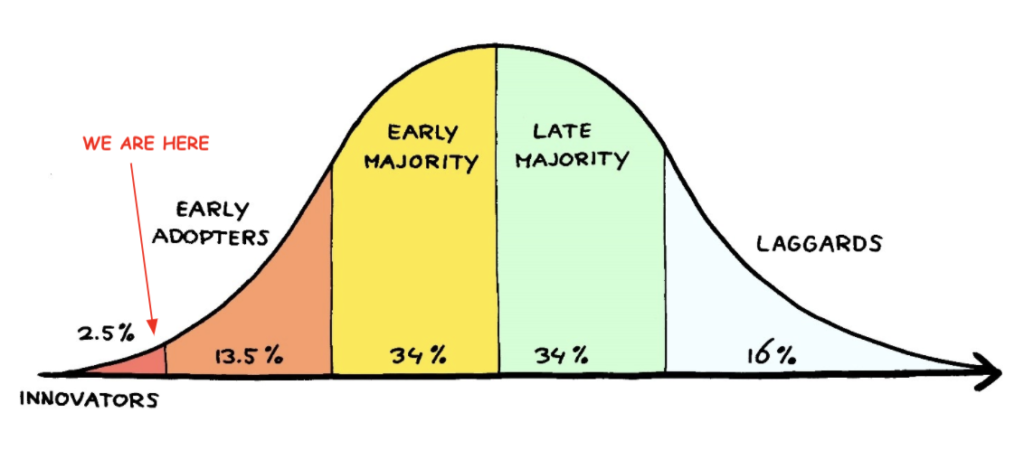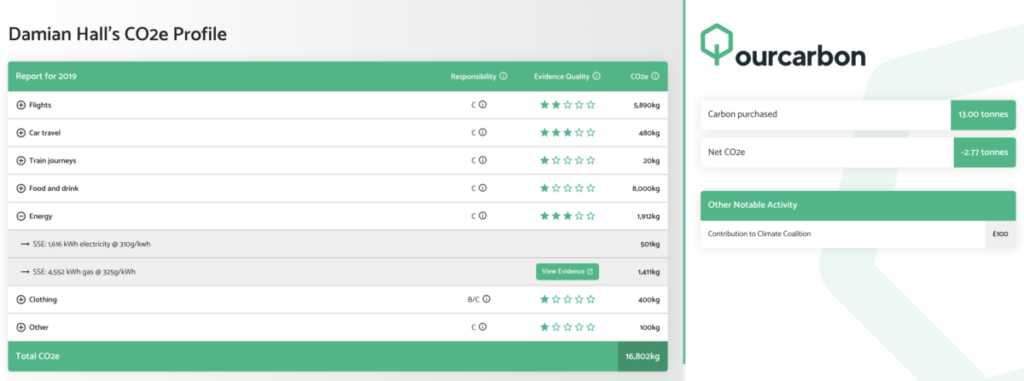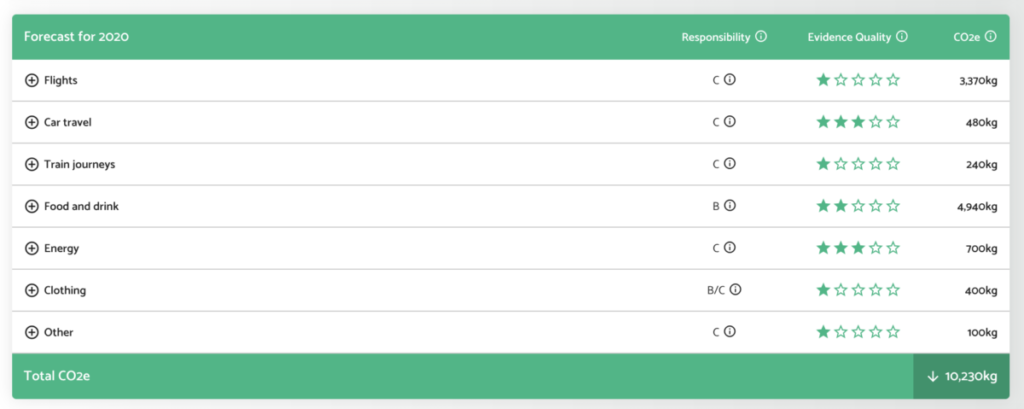Carbon accountability: why charities must lead

While climate change has evolved, at least in our minds, from a looming threat to a clear and present danger, there remains a palpable pack of urgency to inspire individuals, corporations, and communities alike that our time to act is truly now.
Why is this? In part because there is no addressable framework that sets out clearly what needs to happen, when it needs to happen, and who needs to do it. The only thing that is certain is that we all need to play our part.
That isn’t to say the case hasn’t been well made. The brilliant carbon budget studies of Myles Allen make the case for not acting plain: we have ten years before our carbon extraction reaches the point of absolute no return.
Advertisement
Governments across the globe are aiming to deliver meaningful emissions impact in the second half of this decade. Corporations, in the main, are following later. This means the opportunity to take on a leadership position is over the next 4-5 years. It’s in keeping with typical innovation adoption models, which feature early adopters at one end, laggards at the other, and the early and late majority in between.
But surely there has never been a better case that the opportunity – and the necessity given humanity is at stake – to lead is right now.

How do we get moving?
We must start by accepting that our carbon consumption, embedded in every limb of our corporate and private modes of being, is the ultimate oil tanker – not just in literal terms, but the figurative rate at which its ability to turn is limited.
When we founded ourcarbon, we recognised the need to keep the ship sailing, to keep existing systems functioning, while embarking on a new direction and destination. Incremental but decisive changes can and will lead to systemic changes in behaviour. This applies to every individual, and every business, but also between individuals, businesses, communities and nation states.
But someone has to go first. Who will it be? It will be those who are daring enough, willing enough, and able enough. And who is better positioned than charities?
Why charities?
Unlike the corporate model, charities have the expressed and infallible aim of providing care. They are not laboured with the requirement to return shareholder value at any cost.
The value they create for their subject is measured differently. Charities have the DNA to care; to go first before it’s officially required.
In my five years of leading Givey, driving innovation to reformat our relationship with donation, I’ve seen the abilities that charities have to be brave, to change their habits, and to adapt to new and critical opportunities. So I know charities can do it. The cultural and organisational changes required to make carbon neutrality are fundamentally simple, and as such it should be easier for them to set the pace for change, and a shining example of best
practice.
Whether your charity is in animal welfare, child safety or homelessness, your ability to provide care is predicated on having the environment to support it. So whatever your subject is, and whatever motivates you or your charity, this is ultimately about all charities leading to support the world in which we live.
We know this can be hard. We appreciate that carbon neutrality has become a potential minefield (and at the very least, a bit confused) with ESG, SDGs and sustainability reporting already clogging up the corporate wheels. But whichever umbrella we’re huddling under, this journey starts, as most journeys do, with accountability.
Carbon accountability
Carbon accountability, however, goes further still. Whether you’re talking about fostering a spirit of carbon responsibility and positivity, or embracing and advocating for carbon’s inclusion at the accounting level of your charity’s operations, it’s all part of the dramatic change that is needed. They are two sides of the same coin. One can happen right now; the other cannot, but must not be far behind.
Before we set up ourcarbon we came to realise that what was ultimately needed wasn’t to advocate for creating less carbon, or offsetting more. A lot of that work is already happening, and of course we welcome it.
What is needed is genuine leadership, confidence, and commitment – supported by the right processes and tools. That is why it must be charities, with their influence and voice, who have always occupied this space, who should be among the earliest adopters, inspiring others along what will be a hard but necessary journey.
It could also be argued that charities adopting carbon neutrality is a prerequisite for more seismic change, to set the table for smaller and mid-sized businesses – both by setting the right example, but bringing to bear their experience and expertise in driving transformation and adding value, as opposed to profit.
How can a charity become carbon neutral?
The ourcarbon approach is based on a very simple premise, and one that is already ingrained in sound business logic: you can’t manage what you don’t measure. Otherwise we’re just dealing in rhetoric. So calculate your carbon!
Accounting for the carbon you’re using is the first building block for achieving carbon positivity. But it needn’t stop you from considering those parts of your business where you could conceivably make a change today. For example, the most ubiquitous form of carbon extraction is energy consumption. That’s why we’ve partnered with price comparison website, Troo, to help you find ways to build carbon neutrality into your operations – at every link in the chain – without incurring additional cost. As part of this, we have embedded a carbon coach within the troo business to support customers at any point in the journey to net zero.

Building out a functioning ecosystem of carbon positivity, from the ground up, is likely to achieve more than grandiose ‘top down’ systems advocating for but not ultimately enforcing change. We need both.
The steps that need to be followed to achieve net carbon neutrality are, for most companies, much the same. So we can take both lessons and heart from companies that have already reduced their carbon impact, and work with experts who understand what needs to be done. This is where ourcarbon’s community of coaches and participating companies can really help.
We provide the tools to help businesses understand their carbon footprint, but we also suggest what can be done to optimise it. This includes access to a wider community of carbon-cutting businesses, which sets the stage for incremental and sustainable change.
The steps to carbon neutrality
Whether you’re a sole trader, an SME or a large corporate, there is a path to carbon neutrality; at ourcarbon we use a coaching model that allows us to support your business, regardless of the size and scope.

Know your footprint
A journey to net zero can only start with a footprint, or true carbon accounting. It’s important to look at your carbon emissions over time, and to consider the different points of emission across the value chain. These are known as scope 1 (direct emissions), scope 2 (energy) and scope 3 (indirect, sunch as purchased goods). This gives us what we call a carbon profile. Here’s an example of how it looks:


Manage what you measure
Make your carbon-reducing policies as tangible, and relatable as much as you can. Consider closely what the behaviour that is needed to achieve your goal, and how success can be measured.
Leverage the community
Once carbon positivity within the organisation has been achieved, then we can start to look and influence outwards. This can include sharing learnings and successes with other businesses that are at all stages of the carbon reduction journey, or to explore opportunities to partner with businesses that offer some kind of complimentary, carbon-optimising fit.
Will it be enough?
Ultimately for carbon neutrality to become the reality, we need carbon accounting to become truly embedded within our economy. Optimising our organisations individually is an essential step, but we must consider more fundamental and drastic moves that need to be made to put carbon at the heart of our business practice – including, for example, accounting. So we can hope to see carbon as an accounting line in every financial report; a prerequisite for legal submission of accounts. The opportunity is to make it core to our values, not an add-on. This is redesigning and reengineering our processes and priorities from the inside out.
For now, we need to start somewhere. I’ve seen the galvanising power and transformational potential of the charity sector. I know we can do it. And I know we must. So let’s get started!
WATCH: welcome to ourcarbon
da**@ou*******.com">Dave Erasmus is the founder and executive chairman of ourcarbon.





